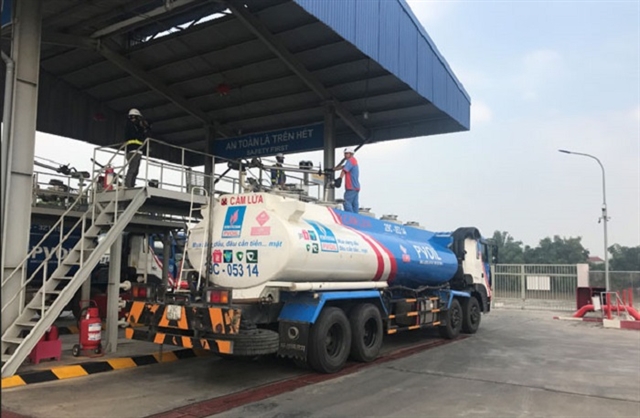.jpg) Economy
Economy

 |
| A fuel truck at a storage facility in Hà Nội. — VNA/VNS Photo |
HÀ NỘI — Economists and industry experts have been calling for a fuel exchange in Việt Nam to be set up, after the Vietnamese government directed the Ministry of Industry and Trade (MoIT) to conduct initial research into establishing one.
Economist Ngô Trí Long said a fuel exchange will reduce monopolies and create opportunities for domestic and foreign businesses. There are 39 fuel trading companies, with the six largest companies holding a significant domestic market share of about 88 per cent.
He said there are major hurdles to overcome in setting up a fuel exchange, including massive investment costs for infrastructure, technology and human resources, followed by a rigid monitoring system to prevent market manipulation.
"While the exchange cannot address all the issues in the fuel market, an exchange is the beginning of a process to make the fuel market more transparent and open, thereby changing the behaviour of economic players," he said.
Trịnh Quang Khanh, vice chairman and secretary-general of the Vietnam Petroleum Association, said while more businesses participating in the fuel exchange is a desirable outcome, consensus among traders, careful planning and implementation by the government is required to realise that objective.
For the time being, the association recommended the government support businesses in trading through the MXV, rather than immediately establishing a fuel exchange.
Nguyễn Ngọc Quỳnh, deputy director of the Mercantile Exchange of Vietnam (MXV), said under the current legal framework, businesses have been allowed to participate in fuel trading on the national, and the only, commodity exchange in the country since 2020.
He said so far, trading has been safe and stable, without major incidents and it is starting to attract investors. It has also served as an information collection tool for regulators.
"However, it has not been able to attract businesses due to policy uncertainties. For example, trading was halted on May 27 this year as the Ministry of Industry and Trade revised current regulations on fuel trading on the MXV," he said.
He said Việt Nam has successfully set up and run exchanges for other commodities, so an exchange for fuel wouldn't be vastly different from others.
"The main objective remains how to best support trading activities with measures aimed at enhancing transparency, increasing liquidity for traders and improving access for retailers," he said.
Economist Vũ Vinh Phú said an effective exchange would allow the market to reach its optimal state while boosting the country's fuel reserves. Businesses should be able to regulate their prices and pressure on the fuel price stabilisation funds reduced.
Phú said Việt Nam has done it before with coffee, rice, securities and other commodities, which have been said to play an important role in preventing tax losses, smuggling and improving quality control.
In addition, the establishment of a fuel exchange at a time when the Southeast Asian economy has been seeking recognition as a market economy should only be seen as a step in the right direction.
Petrolimex's deputy director-general Nguyễn Xuân Hùng said that given the country's oil import/export balance Việt Nam's domestic market will likely continue to be influenced by global prices.
Hùng said purchases on the world's only two fuel exchanges tend to be future deliveries, meaning it may take anywhere from 15 to 45 days to receive the goods, so in that sense, a fuel exchange may provide some price insurance for traders. VNS




